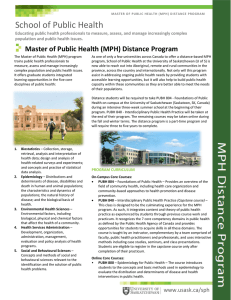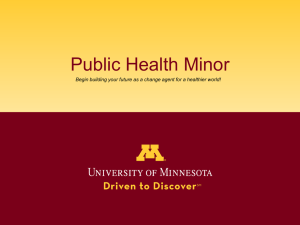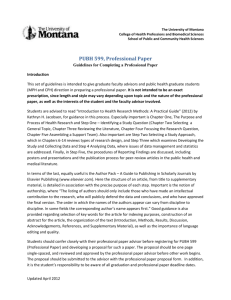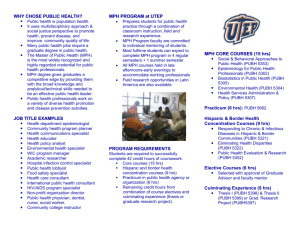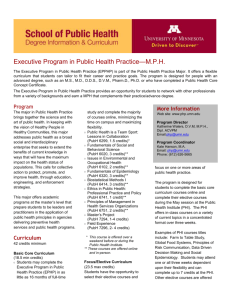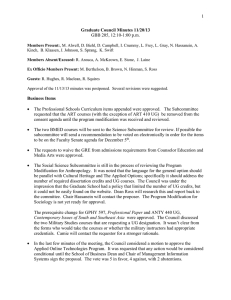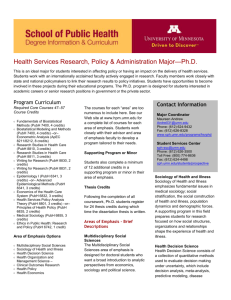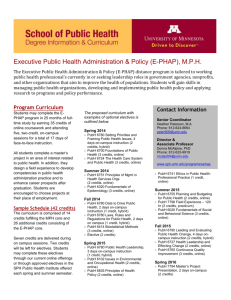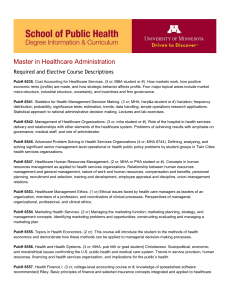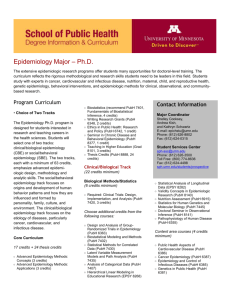MPH Student Handbook - University of Saskatchewan
advertisement
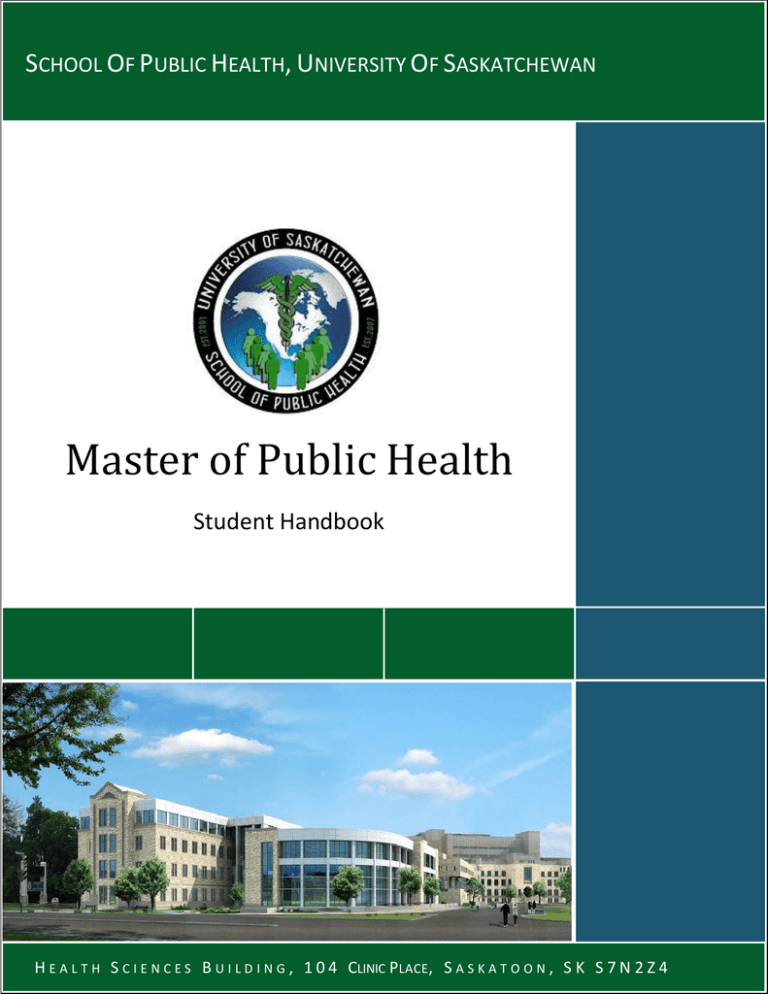
SCHOOL OF PUBLIC HEALTH, UNIVERSITY OF SASKATCHEWAN Master of Public Health Student Handbook H E A L T H S C I E N C E S B U I L D I N G , 1 0 4 CLINIC PLACE, S A S K A T O O N , S K S 7 N 2 Z 4 Table of Contents Master of Public Health ............................................................................................ 3 Program Curriculum ................................................................................................. 4 Core-Required Courses ............................................................................... 5 Elective Courses.......................................................................................... 6 Registration Information ........................................................................................... 8 MPH Practicum ...................................................................................................... 10 School of Public Health Policies ............................................................................. 12 School of Public Health Student Association .......................................................... 13 Student Resources and Services ........................................................................... 14 Suggested Program Sequence .............................................................................. 15 Appendix ................................................................................................................ 16 Core-Required Courses Description .......................................................... 16 Elective Courses Description ..................................................................... 17 Staff ........................................................................................................... 20 Faculty ....................................................................................................... 21 Contact Information ................................................................................... 23 Master of Public Health Master of Public Health The Master of Public Health (MPH) Program trains public health professionals to measure, assess and manage the ever-increasing complexity of population and public health issues. The program’s aims and objectives are to: 1. Prepare students to work in the public health field by: a. providing foundational knowledge within the 5 core areas of Public Health: • Biostatistics – Collection, storage, retrieval, analysis and interpretation of health data; design and analysis of health-related surveys and experiments; and concepts and practice of statistical data analysis. • Epidemiology – Distributions and determinants of disease, disabilities and death in human and animal populations; the characteristics and dynamics of populations; the natural history of disease; and the biologic basis of health. • Environmental Health Sciences – Environmental factors, including biological, physical and chemical factors that affect the health of a community. • Health Services Administration – Development, organization, administration, management, evaluation and policy analysis of health programs. • Social and Behavioural Sciences – Concepts and methods of social and behavioural sciences relevant to the identification and the solution of public health problems. b. partnering with public health agencies in Canada, as well as the international community, to provide opportunities in which students can apply their foundational public health knowledge in the field and gain practical experience. 2. Familiarize students with the Public Health Agency of Canada (PHAC) core competencies and how the PHAC competencies relate to the above five core areas of Public Health. 3. Regularly review and adapt its curriculum to reflect the current needs in Public Health, as identified by stakeholders. 3 Master of Public Health Program Curriculum‡ The MPH is a professional course-based degree with a 12-week practicum. Students are required to complete: • • • • a minimum of 45 credit units o consisting of the 8 core-required classes (24 credit units) o the practicum (6 credit units)* o 15 credit units of elective courses* Public Health Seminar (PUBH 990) every semester Introduction to Ethics and Integrity Course (GSR 960) Ethics and Integrity in Human Research (GSR 961) * During the first year of the MPH program, each student is assigned an academic advisor who will assist them through their practicum and elective course selection. Please note that failure to attend PUBH 804 - Foundations of Public Health course (one of the core-required classes which is only offered once a year and only offered in August) will result in a possible delay in graduation. The program is designed for completion in 2 years of full-time study. Students may also choose to study part-time over a maximum of 5 years. ‡ The curriculum may be updated to reflect current public health issues. 4 Master of Public Health Core-Required Courses All MPH students must pass the following courses: GSR 960 GSR 961 PUBH 800 PUBH 803 PUBH 804 PUBH 805 PUBH 807 PUBH 810 PUBH 840 PUBH 867 PUBH 990 PUBH 992 Introduction to Ethics and Integrity Ethics and Integrity in Human Research Epidemiology for Public Health Health Promotion Foundations of Public Health Biostatistics for Public Health Health Program Planning and Evaluation Environmental Public Health I Inter-disciplinary Public Health Practice Health Policy and Politics Public Health Seminar (every semester)* Public Health Practicum PUBH 806 – Public Health Pathobiology Knowledge of the basic principles of biology in health and disease is fundamental to practice of public health. Individuals with degrees in Medicine, Veterinary Medicine, Dentistry, Nursing, Pharmacy and Physical Therapy will be considered to have this knowledge. Students who do not have a health sciences background MUST register for Public Health Pathobiology (PUBH 806). If required, this class is part of the minimum 45-credit units required for the MPH degree and will be assessed an equivalent of a 3-credit elective course. *Second year students will present their practicum work during the Public Health Seminar. The presentations will be 15-20 minutes long and this will give the students the opportunity to share their practicum experience. This will also be an excellent opportunity for students to enhance their communication and presentation skills. See Appendix 1 to learn more about the core-required courses. Academic Integrity: Students are expected to follow the Guidelines for Academic Conduct at the University of Saskatchewan and to be aware of their rights and responsibilities. Any perceived engagement in academic misconduct such as plagiarism, cheating, and any other form of academic dishonesty will not be tolerated. Consult the following for expectations regarding behavior, assignments and other aspects of university life: http://www.usask.ca/university_secretary/honesty/index.php 5 Master of Public Health Elective Courses All students must complete a minimum of 15 credit units in addition to the core- required courses. These courses may be chosen in consultation with the student’s academic advisor. The following is a list of approved elective courses. Students are encouraged to review the online course calendar for opportunities and details about additional elective courses. Students should remember that not all courses are offered in any given year. AGMD 800 AGMD 801 ANTH 804 CMPT 830 CMPT 857 CMPT 858 NURS 814 NURS 816 NURS 892 NURS 893 NURS 897 NUTR 811 PUBH 808 PUBH 809 PUBH 811 PUBH 812 PUBH 814 PUBH 832 PUBH 842 PUBH 844 PUBH 845 PUBH 846 PUBH 847 PUBH 852 PUBH 853 PUBH 861 VACC 801 VLAC 840 VLAC 881 VTMC 340 Public Health and Agricultural Rural Ecosystem (PHARE) Online Introduction to Occupational Health Medical Anthropology Bioinformatics and Computational Biology Readings in Bioinformatics Topics in Modeling and Operations Research Aboriginal Health Issues (Online) Community within the Context of Diversity and Vulnerability Research Methods (Online) Qualitative Research Methods (Online) Nursing Research Advanced Advances in Public Health Nutrition Research Introduction to Health Care Management Field Epidemiology Biostatistics for Public Health II Emergency Management for Public Health Applied Health Economics Infectious Disease Epidemiology Current Biostatistical Methods and Computer Applications Chronic Disease Epidemiology Clinical Epidemiology Analytic Methods in Epidemiology Research Studies in Addictions Canadian Health Care Systems Seminar in Health Care Organizational Regulation and Policy Health, Post-Secondary Education and Social Program: Funding, Structure and Reform A Multi-disciplinary Introduction of Vaccinology and Immunotherapeutics Zoonosis and Food Safety Clinical Trial Design and Analysis Veterinary Public Health 6 Master of Public Health Prior approval is required previous to registration in any elective course not appearing on th e a p p r ov e d l i s t ab ov e . Please c o m pl et e th e MP H E le c t iv e Course(s) Permission Form and submit it along with a copy of the course syllabus to the SPH Admissions office for the MPH Program Director’s consideration For a complete list of courses at the University of Saskatchewan, visit: http://www.usask.ca/calendar/coursecat/ 7 Master of Public Health Registration Information Students register for classes through PAWS (https://paws.usask.ca) . Your NSID email is the official email address to which all official MPH communication will be sent. Your email username for the U of S Email and Calendar service is our Network Services ID (NSID). The University uses this email service for official communications with students and employees and will be the only address which we use for communication purposes. For more information on how to register, visit: http://students.usask.ca/current/registration/ Dropping classes during the term All registration changes must be completed on the specified dates in the link below. Classes will not appear on a student’s permanent record, and all tuition and fees will be refunded, if dropped by “the last day to add/drop class”. http://students.usask.ca/academics/classes.php#RegisterforClasses 8 Master of Public Health Electives outside of the University of Saskatchewan The Western Deans’ Agreement (WDA) allows students to take courses from universities in Western Canada offering graduate courses for credit on your program. The provinces covered are Manitoba, Saskatchewan, Alberta and British Columbia. Students interested in registering through the WDA are requested to submit a Course Outline for the MPH Program Director’s approval prior to enrolling in the course(s). The tuition will be charged at the U of S (not the host university) and any fees are assessed at the host institution. As with any course taken outside the U of S for credit, you are responsible for ensuring that the host university sends out an official transcript to the College of Graduate Studies when you complete the course. Please contact the office for detailed information. Western Deans Agreement 9 Master of Public Health MPH Practicum As part of the Master of Public Health (MPH) curriculum, graduate students are required to complete a 12-week practicum (minimum 350 contact hours) that allows them to integrate classroom theory in a public health work environment, whether it is within a local public health unit, a provincial or federal governmental agency, or a non-governmental organization. A good fit for the organizations and the students Students throughout their practica contribute to an organization’s resources, address public health issues, and develop personal confidence and skills as a public health professional. The School would like to see graduate students in organizations that: • • • • • require the student to apply graduate- level competencies acquired in the MPH program; address a practical public health problem/issue; advance the student’s knowledge and skills to benefit the organization; have a field supervisor who has public health experience, gives constructive feedback, clearly communicates expectations, understands the student’s needs, and is available and approachable; and provide the necessary organizational environment and supports. Good practica include, but are not limited to: • • • • A research project A surveillance initiative A health promotion project A needs analysis What skills will students have when starting their practica? Generally, students will have completed the core-required course work in: health foundations, biostatistics, epidemiology, health promotion, health policy, environmental and occupational health, and health program planning and evaluation. When do the practica take place? Students normally engage in the practicum during the summer at the end of the MPH program's first year but, depending on the site availability, may complete it at other times of the year. Students should remember that the required courses must be successfully completed (including GSR 960 and 961) prior to starting their practica. 10 Master of Public Health What are the goals for the student? The goals of the practicum include, but are not limited to: • • • • Integration, synthesis and application of public health competencies acquired in core-required MPH courses to a real-world public health situation Work on offering a solution to a substantive public health problem or issue relevant to the sponsoring organization Engagement in professional self-assessment and critical reflection Enhancement and development of skills needed to function in a professional public health setting including: o problem identification, analysis and solving; o interpersonal skills including working as part of an interdisciplinary public-health team; o oral and written communication; and o understanding the mission, structure and function of the public-health organization. A way to ensure success Success of a practicum placement depends on the selection of quality practice locations with experienced and motivated field supervisors and academic advisors. A learning contract will be established at the beginning of the practicum. This will guide the learning activities of the student and provide a framework for student evaluations. Students are responsible for securing their own practicum. The Practicum Coordinator and Program Assistant will provide a list of possible practicum opportunities. Students can either apply to practica on this list or seek their own practicum placement. The list of practica will be available online on the MPH group on PAWS at the end of January in Term 2. Students are not guaranteed to get stipends for their practica, and therefore, students must plan their finances accordingly. That is, along with the cost of registering for PUBH 992, students should remember they are responsible for their own living expenses and other costs that may incur including traveling (unless the organization is willing to cover the costs). To be awarded credit for the practicum, students must successfully complete each of the following components of the practicum: • • • • the field site experience an exit interview a poster presentation a practicum report 11 Master of Public Health School of Public Health Policies 1. Students must attain at least 60% in their elective courses. 2. Students must pass the following courses in order to be eligible to start their Public Health Practicum (PUBH 992): • • • • • • • • • GSR 960 – Introduction to Ethics and Integrity GSR 961 – Ethics and Integrity in Human Research PUBH 800 – Epidemiology for Public Health PUBH 803 – Health Promotion PUBH 805 – Biostatistics for Public Health PUBH 807 – Health Program Planning and Evaluation PUBH 810 – Environmental Public Health I PUBH 867 – Health Policy and Politics PUBH 990 – Public Health Seminar (every semester) 3. Students must finish (or close to being finished) their Public Health Practicum (PUBH 992) prior to taking Inter-disciplinary Public Health Practice course (PUBH 840). Other prerequisites for the course must have been completed. 4. Attendance for PUBH 990 (Public Health Seminar) is mandatory and students must attend at least 75% or at least 36 seminar sessions during their program. 5. Students must complete a minimum of 45 credit units to graduate: • • • • • • consisting of the 8 core-required classes (24 credit units) practicum (6 credit units) 15 credit units of additional courses related to their area of interest Public Health Seminar (PUBH 990) every semester Introduction to Ethics and Integrity Course (GSR 960) Ethics and Integrity in Human Research (GSR 961) 12 Master of Public Health School of Public Health Student Association The University of Saskatchewan’ School of Public Health Student Association (SPHSA) is a student run association providing academic and social support to the students of the School of Public Health. Find School of Public Health Student Association on . Search for “SPHSA”. Visit their website for more info: https://sites.google.com/site/sphstudentassociation/home 13 Master of Public Health Student Resources and Services Academic Dishonesty http://www.usask.ca/university_secretary/honesty/index.php Bookstore http://www.usask.ca/bookstore/ Campus Map http://www.usask.ca/maps/ City of Saskatoon http://www.saskatoon.ca/Pages/default.aspx Core Competencies for Public Health in Canada http://www.phac-aspc.gc.ca/php-psp/ccph-cesp/pdfs/zcard-eng.pdf Fitness and Recreation http://www.usask.ca/activities/recreation.php Graduate Students’ Association (GSA) http://www.gsa.usask.ca/ Health and Dental Plans http://students.usask.ca/current/international/arrival/health.php Housing http://explore.usask.ca/campus-life/ International Students Office http://students.usask.ca/current/international/ Libraries http://library.usask.ca/ Student Card http://www.usask.ca/consumer_services/cardoffice/student_card.php Student Central http://www.usask.ca/sesd/about/scss.php Student Employment and Career Centre http://www.usask.ca/secc/ Student Health and Counselling Services http://students.usask.ca/current/life/health/ UofS Orientation http://students.usask.ca/new/transition/orientation.php 14 Master of Public Health Suggested Program Sequence (for completion of MPH Program in 2 years) It is recommended that students register in no more than 4 classes per term. YEAR ONE Orientation □ Attend Orientation in August Register for Foundations of Public Health in August: □ PUBH 804 – Foundations of Public Health (core) Core-Required Courses: □ □ □ □ □ □ □ □ □ GSR 960 – Introduction to Ethics and Integrity GSR 961 – Ethics and Integrity in Human Research PUBH 800 – Epidemiology for Public Health PUBH 803 – Health Promotion PUBH 805 – Biostatistics for Public Health PUBH 807 – Health Program Planning and Evaluation PUBH 810 – Environmental Public Health I PUBH 867 – Health Policy and Politics PUBH 990 – Public Health Seminar (ALL semesters until completion) Once you have successfully completed the required courses, you are eligible to do your practicum (see page 12 for listing): □ Public Health Practicum (PUBH 992) (core) Students who do not have a health sciences background MUST register for Public Health Pathobiology. This course is only offered in Term 1 each year. It is recommended to be completed in Year One, but it is not required to be completed in Year One. □ PUBH 806 – Public Health Pathobiology YEAR TWO Once you have successfully completed PUBH 800, 803, 805, 807, 810, 867, 992, you are eligible to do your CAPSTONE course: □ Inter-disciplinary Public Health Practice course (PUBH 840) (core) To be able graduate from MPH, you must also complete a minimum of 15 credit units in the areas of your interest: □ 15 credit units’ electives Other graduation requirements set by University of Saskatchewan: □ Apply for graduation, online on PAWS before the deadline date (March 31st) □ Pay all your fees including library dues Optional: Before graduation, students also may arrange for: □ Graduation pictures □ Rent convocation gown online or at the venue 15 Master of Public Health Appendix Appendix 1 – Core-Required Courses Description GSR 960.0 - Introduction to Ethics and Integrity -This is a required course for all first year graduate students at the University of Saskatchewan. The purpose of this course is to discuss ethical issues that graduate students may face during their time at the University. All students will complete modules dealing with integrity and scholarship, graduate studentsupervisor relationships, conflict of interest, conflict resolution and intellectual property and credit. GSR 961.0 - Ethics and Integrity in Human Research - Introduces students to the ethics of research with human subjects. Students will complete the Tri-Council Policy Statement: Ethics Conduct for Research involving Humans (TCPS) Tutorial and become familiar with the human ethics processes at the University of Saskatchewan. PUBH 800.3 - Epidemiology for Public Health - The course will introduce students to the concepts and basic methods used in epidemiology to evaluate the distribution and determinants of disease and health interventions in public health. It is a core course for students in the Master of Public Health program, but open to other health science students. Note: students with credit for CHEP 800 will not receive credit for this course. PUBH 803.3 - Health Promotion - This course covers the underlying concepts, principles, historical development, theory, and current practice of health promotion. The focus of learning is not so much on “how to do” health promotion, as on “how to think” about the conceptual, ideological, and political issues which underlie health promotion practice. Topics include: empowerment and community, change in individuals, small group development, community organization, healthy public policy, coalition-building and advocacy, linking research and action. PUBH 804.3 - Foundations of Public Health (Offered in Term 1) - Provides an overview of the field of community health, including health care organization and community-based approaches to health promotion and disease prevention. PUBH 805.3 - Biostatistics for Public Health - This course is designed for students who wish to understand basic biostatistical methods and principles as they apply to public health data. The methods include descriptive statistics, confidence intervals and hypothesis testing, analysis of variance, non-parametric methods, multiple regression and logistic regression. The emphasis of the course is on applications of these methods to public health data, on correct interpretations of the resulting analyses as to be presented to both public health professionals and general lay audiences, and on the critical appraisal of these methods as used in the public health literature. The course also introduces the computer software program SPSS as it applies to the statistical topics discussed in the course. Prerequisite(s): 70% or higher on the Biostatistics portion of PUBH 804.3. Note: Students with credit for CHEP 805 will not receive credit for this course. PUBH 806.3 - Public Health Pathobiology (Offered in Term 1; Exempt for students with clinical health science background) - The course will introduce students to the biological and molecular basis of public health so they are able to incorporate this knowledge into their practice of public health. PUBH 807.3 - Health Program Planning and Evaluation - Covers basic concepts and principles of the cycle of health program planning, which includes needs assessment, program development and implementation, process, impact, and outcome evaluation. Both qualitative and quantitative data collection will be addressed. Guest speakers, case studies, and assignments will link conceptual material with concrete applications. PUBH 810.3 - Environmental Public Health I -This course is an introduction to and an overview of the key areas of environmental public health practice. Using the perspectives of the population and community, the course will cover factors associated with the development of environmental health problems. Students will gain an understanding of the interaction of individuals and communities with the environment, the potential impact on health of environmental agents, and specific applications of concepts of environmental public health practice. Note: Students who received credit for AGMD 801 in Spring and Summer of 2012 may not take this course for credit. Students taking this course in September of 2012 and beyond may receive credit for both AGMD 801 and PUBH 810. PUBH 840.3 - Inter-disciplinary Public Health Practice (Offered in Term 1) - This class is designed to be the culminating experience for the MPH program. As such, it integrates content and theory of public health practice as experienced by students through previous course work and practica. It recognizes the 7 core competency domains in public health as defined by the Public Health Agency of Canada and provides opportunities for students to acquire skills in all these domains. The course is taught by a team of instructors comprised of faculty, public health practitioners and professionals, and uses interactive methods including case studies, seminars, and class presentations. Students are eligible to register in the capstone course only after completion of their practica. (PUBH 992). Prerequisite(s): PUBH 992, PUBH 800, PUBH 803, PUBH 805, PUBH 867, PUBH 810. PUBH 867.3 - Health Policy and Politics - Deals with program and service planning for health care at the institutional, community, regional and provincial, national and international levels. The course takes a macro approach to broad health policy and planning goals and follows these policies through to the level of institutional implementation. Policy analysis is an important component and much class time is spent analysing real life policy documents. 16 Master of Public Health PUBH 990.0 - Public Health Seminar - This non-credit course offers students an excellent opportunity to enhance their communication and presentation skills. Second year students are expected to present their practicum work during the Public Health Seminar. The presentations will be 15-20 minutes and will give the students the opportunity to share their practicum experience. Students are required to register in every term until completion. PUBH 992.6 - Public Health Practicum - Public health practice is a central feature of the MPH degree. The practicum provides the opportunity to integrate classroom learning with practice in a public health work environment. Working in a partner agency in the community, the student addresses a public health problem while developing personal confidence and skills as a public health professional. Appendix 2 - Elective Courses Description AGMD 800.3 - Public Health and Agricultural Rural Ecosystem (PHARE) online - Provides the foundation knowledge for issues related to rural health, public health and agricultural rural ecosystems. This PHARE course provides an overview of the major health issues, general health, and health service delivery issues facing persons in rural and remote areas of Canada. It provides an overview of the environmental health challenges for rural and agricultural populations in the areas of risk management, injury control, workplace safety, food safety, and protection of the biosphere. Note: AGMD 800 provides the foundation for the Public Health and Agricultural Rural Ecosystem Training Program (PHARE), a graduate training program funded by the Canadian Institutes of Health Research (CIHR). As well, AGMD 800 is beneficial as an elective to students enrolled in such disciplines as Veterinary Medicine, Agriculture, Nursing, Medicine, Dentistry, Economics, Community Health and Epidemiology, Engineering and Health Policy. AGMD 801.3 - Introduction to Occupational Health - This course is an introduction to occupational health, industrial hygiene, and the relationship of the work environment to the broader environment. It will provide an overview of occupational hazards and illnesses including their recognition, control and prevention, as well as, the relationship between workplace exposures and the broader environment. This course includes an introduction to compensation and regulatory issues along with site visits to selected industries and job sites. ANTH 804.3 - Medical Anthropology - Will survey the theoretical and conceptual trends within the field of medical anthropology, spanning biocultural, clinical, ecological, political economic and critical interpretive approaches. The substantive areas of focus include reproductive health, infectious disease, disability, mental illness, health systems, and healing. Permission of the instructor required. CMPT 830.3 - Bioinformatics and Computational Biology - Provides an in-depth algorithms-based introduction to major concepts and techniques in bioinformatics. Topics include algorithms for structure prediction and similarity, sequence similarity and alignment, metabolic and regulatory pathways, sequence assembly, comparative genomics, expression analysis, database searching, artificial life and biological computation. Prerequisite(s): A previous BINF class, or at least 6 credit units of previous course work in each of computer science, statistics and the life sciences. CMPT 857.3 - Readings in Bioinformatics - Reviews and discusses recent advances and issues in Bioinformatics through paper presentation by students. Topics will range from computational biology to artificial life and biological computation. Students will be evaluated based on their presentations and participation, as well as a small project. Prerequisite(s): Open to students in computer science, life sciences, and natural sciences, but subject to permission of the instructors. CMPT 858.3 - Topics in Modeling and Operations Research - In-depth coverage of recent research areas from Operations Research, and applications to system modeling. Advanced topics from mathematical programming, queuing theory, inventory control, simulation, Markov modeling, and simulation. Prerequisite(s): CMPT 818 or equivalent. NURS 814.3 - Aboriginal Health Issues (Online) - Examines issues and challenges related to the health of Aboriginal populations in Canada. Health and illness concepts will be embedded within historical, social, cultural, and political realities. The student will have the opportunity to critically examine and reflect on Aboriginal health issues and health care practices . Prerequisite(s): Enrolment in a graduate program and completion of at least one graduate-level foundational course. NURS 816.3 - Community within the Context of Diversity and Vulnerability - Involves intensive inquiry into selected topics on community within the context of diversity and vulnerability. Traditions of research, philosophical assumptions and epistemological stances for conducting research with these populations will be examined. Ethical and methodological issues related to community-based research will be explored in the context of contributions to culturally relevant knowledge. Prerequisite(s): NURS 895 NURS 892.3 - Research Methods (Online) - Focuses on research methodology with application to clinical nursing problems. Major emphasis will be placed on elements of the research process, critical analysis and evaluation of nursing research, quantitative and qualitative research design, and developing proposals for nursing research investigations. Prerequisite(s) or Corequisite(s): NURS 891 or permission of the instructor. 17 Master of Public Health NURS 893.3 - Qualitative Research Methods (Online) - Provides opportunity for in-depth examination of the main traditions of qualitative research inquiry and methods. Included are: critical discussion of all elements of method and experience of writing a qualitative proposal with respect to nursing issues. NURS 897.3 - Nursing Research Advanced - The focus of this research course is on the design of quantitative research to advance the development of nursing knowledge. The course will examine various theories and assumptions of research design, measurement, and intervention development to investigate nursing practice issues and health outcomes. Prerequisite(s): NURS 892 or equivalent. NUTR 811.3 - Advances in Public Health Nutrition Research (T2 alternate years 2014 next) - Concepts and recent advances in a variety of topics in the domain of Public Health Nutrition are described and discussed with emphasis on evaluating nutritional status at population level and on community-based nutrition interventions. The course is instructed in three sections including Nutritional epidemiology, Food Security, Food and Culture. Students will be exposed to quantitative and qualitative approaches to research in public health nutrition. Students will learn through a combination of faculty lectures and student presentations, assignments, practice on data analyses and interpretation, and papers in a self-directed study format. PUBH 808.3 - Introduction to Health Care Management - Meant to serve as an introduction to management for students in the School of Public Health with little or no management education or work experience. Students will learn management principles applied to health care systems; skills of critical reading; computational competence; and presentation and discussion skills at a graduate level. It will prepare them for more advanced classes in health management. Prerequisite(s): Permission of the Master of Public Health Program. Restriction(s): Registration in the College of Graduate Studies and Research PUBH 809.3 - Field Epidemiology - Links the underlying theory to the practical application of epidemiological methods in the investigation and control of disease outbreaks. Case examples will be drawn from communicable and non-communicable diseases in both humans and animals. Prerequisite(s): PUBH 800 or equivalent. Note(s): Students with credit for CHEP 809 may not take this course for credit. PUBH 811.3 - Biostatistics for Public Health II - This course is a continuation of PUBH 805.3 and includes several multivariate biostatistical methods and principles that are commonly used in public health research. The course topics include logistical regression, analysis of variance and covariance, experimental design and inference for Epidemiology, observational data analysis, categorical data analysis, person-time data analysis, and reliability. The course also introduces SAS programming as it applies to the course topics. Prerequisite: PUBH 805.3, CHEP 805.3, STAT 845.3 or another graduate course in statistics and permission of the instructor. PUBH 812.3 - Emergency Management for Public Health – This course takes a One Health/All Hazards approach to health emergency management (encompassing risk analysis, preparedness, detection, response, and recovery). We will explore special considerations for disease outbreaks, natural disasters, and bioterrorism through scenario-based exercises. Students will have the opportunity to become certified in the Incident Command System (ICS 100). PUBH 814.3 – Ap p l i e d Health Economics - This course is designed to introduce graduate students with no background in economics to the concepts and applications of health economics. This courses adopts an applied approach to understanding health economics requiring each student to participate in a group project using real data to produce a health economics project paper at the end of the course. The course has an international focus and therefore the course will draw upon the health economics literature from both developing and developed countries. Prerequisite: PUBH 805 Note: Students with credit for JSGS 837 will not receive credit for this course. PUBH 832.3 - Infectious Disease Epidemiology - Lectures and exercises will provide an introduction to epidemiology of infectious disease including issues in diagnosis and surveillance, disease ecology and transmission, options for control, discussion of diseases important to public health, emerging diseases, and reporting. Formerly: VTMC 832 Prerequisite(s): PUBH 800.3 or equivalent and an introductory course in microbiology or by permission of the instructor. Note: Students with credit for VTMC 832 will not receive credit for PUBH 832. PUBH 842.3 - Current Biostatistical Methods and Computer Applications - This course will introduce statistical methods commonly used by biostatisticians and their application in current research problems. The emphasis will be on the analysis of discrete outcomes and time-to-event data in observational and experimental designs. Class participants will develop skills in applying statistical models using existing software. Prerequisite(s): PUBH 805 or equivalent. PUBH 844.3 - Chronic Disease Epidemiology - This is an advanced course that examines the theory, methods and applications of epidemiology in chronic disease and health conditions. The course identifies conceptual approaches and methods in survey research, the use of administrative health data, biomarkers, and the control of bias. Students apply this foundational knowledge to the leading chronic health conditions through presentations and a critical review of research protocols. Prerequisite(s): CHEP 800.3 or equivalent. 18 Master of Public Health PUBH 845.3 - Clinical Epidemiology - Clinical epidemiology is the science of applying the best available research evidence to clinical care. This is an advanced course which emphasizes the principles and methods used in clinical decision analysis, screening and diagnostic testing, intervention studies, and the preparation of systemic reviews and clinical practice guidelines. Prerequisite(s): CHEP 800.3 or equivalent. PUBH 846.3 - Analytic Methods in Epidemiologic Research - Will give students an advanced and comprehensive understanding of the principles of design and statistical analysis of epidemiologic research. Students will learn the strengths and weaknesses of established methods of epidemiologic research and will also achieve the ability to independently design, perform, analyse and critique observational health research. Prerequisite(s): Epidemiology for Public Health (PUBH 800.3) or equivalent, Biostatistics for Public Health (PUBH 805.3) or equivalent, Current Biostatistical Methods and Computer Applications (PUBH 842.3) PUBH 847.3 - Studies in Addictions - An introduction to the study of addictions, with a specific focus on problematic alcohol and illicit drug use. Introduces students to concepts and debates in the addictions field concerning causes, consequences and interventions from four standpoints: the user, society/culture, service providers, and decision/policy makers. Prerequisite(s): Registration in the M.P.H. program or Departmental permission. PUBH 852.3 - Comparative Health Systems - Reviews the Canadian health system using a comparative approach with health systems in several other countries that have similar social economic characteristics and share similar values with Canada. Examines the organization, governance and financing; economics, public/private mix and system performance; health human resources and resource management; primary health care; pharmaceutical policy and public health strategies. PUBH 853.3 – Seminar in Health Care Organizational Regulation and Policy - Explores management issues unique to health care organizations. It includes an examination of the regulation of health care organizations. Also covered are such topics as cost benefit/cost-effectiveness/cost-efficiency analysis, managerial accounting as it relates to the health care environment, health care finance and the management of case mix systems. PUBH 861.3 - Health, Post-Secondary Education and Social Programs: Funding, Structure and Reform - The course will begin by establishing the foundations for the current funding of health, care, post-secondary education and Canadian social programs. The course will also consider the main elements of a budget. The major assignment for the class will involve students working together to compile a provincial budget. The course will consider the various policy tools used to reform Canadian social programs and post-secondary education and discuss why similar reforms have not occurred in health care. The course will also teach students how to write key government documents, such as briefing notes and budget materials. Prerequisite(s): PUBH 867 or departmental permission. Restriction(s): Restricted to students in the College of Graduate Studies and Research. Note: Students with credit for JSGS 861 may not take this course for credit. VACC 801.3 - A Multi-disciplinary Introduction to Vaccinology and Immunotherapeutics - This required course provides an introduction to the scientific basis of vaccination, the pathobiology of infectious diseases, vaccine manufacturing, production and commercialization, as well as socio-ethical aspects of vaccines such as risk perception and public acceptance. Other topics will include legal issues such as intellectual property law, public health aspects of vaccines, national and international immunization programs and the use of vaccines in disease outbreaks. The course will be taught by recognized experts in the field with guest lectures given by experts from both industry and regulatory authorities. Prerequisite(s): Admission to the College of Graduate Studies and Research and permission of the School of Public Health. VLAC 840.3 - Zoonosis and Food Safety - Will focus on the characterization and distribution of diseases common to animals and man. A selection of important zoonoses and food safety issues will be specifically covered with an emphasis on the principles of zoonotic disease transmission and control, risk factors to humans, and surveillance methods. VLAC 881.3 - Clinical Trial Design and Analysis - A course for veterinary graduate students who need an understanding of clinical trial design, statistics and clinical epidemiology in order to carry out their research and to evaluate themselves as clinicians. The course will cover areas of clinical trial design, applied medical statistics, diagnostic test evaluation and writing research grants. Prerequisite(s): Permission of instructor. VTMC 340.3 - Veterinary Public Health - Intended to demonstrate the role the veterinary profession plays in public health protection in Canada. The practicing veterinarians and veterinarians who work as public health professionals play a role in serving public health in aspects such as disease surveillance, risk analysis, biosecurity, foreign animal disease containment, food safety, and international public health. The course will also emphasize how public health is protected in Canada through aspects such as food and water safety, animal feeds, antimicrobial resistance, and waste disposal. By using examples of zoonotic and emerging diseases, the course will attempt to illustrate the various points of contact and interventions for diseases shared by animals and people. 19 Master of Public Health Appendix 3 - Staff Lalita Bharadwaj MPH Program Director and Professor, School of Public Health Email: lalita.bharadwaj@usask.ca Michael Szafron MPH Practicum Coordinator and Assistant Professor, School of Public Health Email: michael.szafron@usask.ca Susan Mason MPH Program Assistant, School of Public Health Email: susan.mason@usask.ca Phone: (306) 966-2296 Fax: (306) 966-2264 Karen Ruston MPH Practicum Assistant, School of Public Health Email: karen.ruston@usask.ca Phone: (306) 966-2675 Fax: (306) 966-2264 29 Master of Public Health 2014-15 Appendix 4 - Faculty The School of Public Health works closely with world-renowned research centres and leading scientists, industry experts and practitioners within the University of Saskatchewan. Along with providing education and training, our faculty have achieved national and international reputations for excellence in their respective fields. Interim Executive Director George Mutwiri Control of infectious diseases with vaccines, adjuvants and immunotherapeutic agents. Faculty Members Barriers and Key Issues to the Access of Safe and Sustainable Drinking Water Sources in First Nations Communities ; Community Based Participatory Research with Indigenous Communities; Human and Environmental Health Risk Assessment; Community-Based Education Smoking cessation policy; Domestic violence prevention; Environmental health; Women's health Health policy; Health economics; Health care financing in developing countries; Health program evaluation; Macroeconomics and health Spatial statistics and disease mapping; Statistical methods for survival and longitudinal data; Environmental and ecological statistics; Infectious disease surveillance; Functional data analysis Lalita A. Bharadwaj Yelena Bird Marwa Farag Cindy Xin Feng Physical Activity Epidemiology, Transportation and Health, Population Health Interventions, Natural Experiments, Health Inequities Daniel Fuller Philip Griebel Rein Lepnurm Janice MacKinnon John Moraros Michael Szafron Developmental immunology; Comparative immunology; Mucosal immunology; Innate immunity; Vaccine delivery Health care policy and strategy; Medical care organization; Entrepreneurship Fiscal policy; Health policy; Federal-provincial relations Cancer epidemiology in minority populations; Cancer prevention through lifestyle change, such as dietary practices and smoking behavior; Cancer screening practices; Health disparities; Aboriginal health; Immigrant and refugee health; Intimate partner violence; STI and HIV/AIDS; Alcohol and drug abuse Monte Carlo simulations; Statistical methods associated with Monte Carlo data; Computational biomodelling of the structure/function of biopolymers ; Statistical methods for the health sciences Suresh Tikoo Molecular virology; Viral pathogenesis; Virus-host interactions; Vaccinology; Mucosal immunization; Viral vectors; Dendritic cell vaccines Joint Faculty Members Carl D’Arcy Tasha Epp Emily Jenkins Hassan Vatanparast Cheryl Waldner Professor and Director of Applied Research, Psychiatry, College of Medicine Professor, School of Public Health Academic Director, Saskatchewan Research Centre (SKY-RDC) Member, College of Graduate Studies and Research Associate Member, Canadian Centre for Health and Safety in Agriculture Guest Professor, School of Public Health, Jilin University, Changchun, China Associate Professor of Zoonosis, Large Animal Clinical Sciences, Western College of Veterinary Medicine Associate Professor, School of Public Health Assistant Professor, Veterinary Microbiology, Western College of Veterinary Medicine Assistant Professor, School of Public Health Assistant Professor, College of Pharmacy and Nutrition Assistant Professor, School of Public Health Professor of Epidemiology, Large Animal Clinical Sciences, Western College of Veterinary Medicine Professor, School of Public Health 21 Master of Public Health Associate Faculty Members Larry Brawley Colleen Dell Use of physical activity as a health promotion and disease prevention behavior; Social and psychological factors that influence adherence to physical activity for fitness, therapy and physical function; Related investigations of symptomatic and asymptomatic populations of young to older adults and selected physical disability populations; Barriers to physical activity and measurement of barriers; Group-mediated cognitive behavioural counseling for self-regulation and self-management; Individual and community-based interventions; Messaging and mass-media campaigns; Knowledge translation and mobilization Research Chair in Substance Abuse Associate Professor, Department of Sociology, College of Arts and Science Associate Professor, School of Public Health Senior Research Associate, Canadian Centre on Substance Abuse Paul Hackett Allergic disease; Inflammation Health promotion and chronic disease prevention through regular physical activity; Study of selfregulatory skills (e.g., identifying and coping with salient barriers, self-monitoring, relapse prevention, etc.) and related efficacy beliefs important to physical activity adherence; Self-regulatory interventions to promote physical activity adherence; Individuals with arthritis are of primary interest as well as adults in transition (e.g., into young adulthood, older adulthood) Historical and geographical patterns of the health of western Canada’s First Nations Beth Horsburgh Self-care and caregiving in the context of adults with chronic kidney disease Qualitative and prospective longitudinal designs and instrument development John Gordon Nancy Gyurcsik James Irvine Shelley Kirychuk Niels Koehncke Anthony Kusalik Debra Morgan Donna Rennie Thomas Rotter Natalie Shiff Kevin Spink Ulrich Teucher Sylvia van den Hurk Aboriginal health; Northern health; Public health; Environmental health assessment; Communicable disease control health promotion Respiratory health of agricultural populations and occupational hygiene Occupational health; Occupational respiratory exposures and illness; Noise exposure, noise induced hearing loss; Occupational injuries Logic programming; Bioinformatics; Neural networks; Intelligent methods for VLSI design; Internet security Rural health care delivery; Worklife issues affecting nursing aides employed in rural long-term care facilities; Care of long-term care residents with dementia; Culture change in long-term care; Physical and social environments of long-term care facilities and their impact on residents and staff; Knowledge translation and exchange in long-term care, particularly in rural settings Respiratory epidemiology; Community health nursing; Asthma education Research Chair in Health Quality Improvement Science. Pediatric Rheumatology Group dynamics and the application of group interventions to promote exercise and adherence behaviour; Relationship between various social-psychological correlates/determinants and adherence to physical activity across the lifespan Cultural concepts of health, illness and identity throughout the lifespan DNA vaccines; Bovine herpesvirus-1 (BHV-1); Respiratory syncytial virus (RSV); Hepatitis C virus (HCV) 22 Master of Public Health Appendix 5 - Contact Information Program and General Inquiries For all general inquiries regarding the School of Public Health, please contact us at:: School of Public Health University of Saskatchewan E- Wing Health Sciences 104 Clinic Place Saskatoon, SK S7N 2Z4 Email: sph.admissions@usask.ca Office Hours: Monday to Friday, 8:30 am to 12 pm and 1 pm to 4:30 pm. Closed on Statutory Holidays. 23 Master of Public Health 24 Master of Public Health 25 Master of Public Health 26
